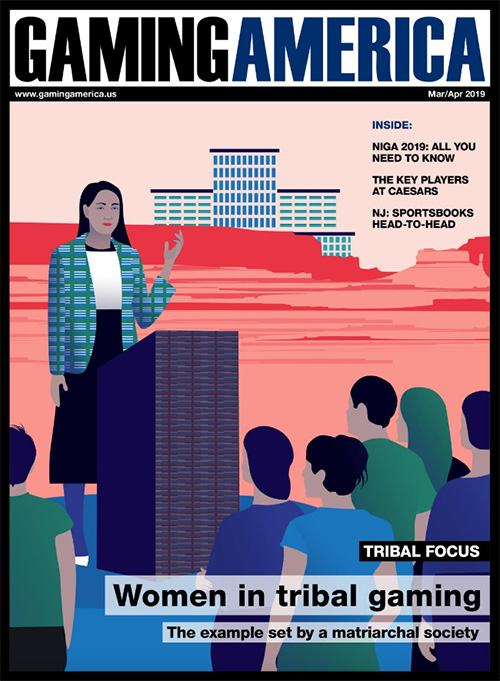
Sean Chaffin looks into the difficulties online poker regulation continues to face in the US
It was a rare case of bipartisanship in December. State legislators in Michigan approved a broad-based internet gambling bill that would not only legalise online poker, but other forms on online gambling and sports wagering.
It appeared for the first time in years, the online poker industry might be showing some signs of catching up with the continuing growth of the live game, and seemed on a bit of a roll. Online sports betting went live in Pennsylvania in late 2018, and poker was expected to be live online in the early part of this year.
Pennsylvania brings the number of online poker states to four and also includes New Jersey, Delaware and Nevada. Michigan seemed like a nice addition to that slowly growing number. The legislation threaded some needles to become a reality –pleasing the state’s commercial casinos, tribal gaming and the horseracing industry.
But it wasn’t to be. With a veto, outgoing Governor Rick Snyder shut down the hopes of players and those in the industry. The move delayed the possibility of a state with a population of almost 10 million adding to a possible shared liquidity market among the other states – creating larger player pools and payouts. That legislation now has to wait for a new governor and legislature. It was a frustrating moment for those hoping to see the game expand.
“I look at it more as a minor setback,” says Dustin Gouker, an industry analyst and editor for OnlinePokerReport.com and LegalSportsReport.com. “There is clearly an appetite to legalise online gaming, and all the stakeholders in the state appear to be on the same page, so hopefully we'll see a similar bill move this year.”
While sports betting states are falling like dominos, online poker’s progress has been slower. Those in the industry are hoping changes and sports wagering may bring an unexpected opportunity to keep the game growing.
Trends and challenges
There’s no doubt poker remains extremely popular in the US. But since Black Friday, which shut down online poker at a federal level on 15 April 2011, the industry has been in a bit of limbo. A state-by-state approach has been slow and those with legalised online poker have seen a diminishing number of players and financial returns. A look at New Jersey serves as a snapshot. For 2018, online poker revenue decreased 13% to $21.4m.
“It's hard to be terribly optimistic about the US online poker industry based on early returns,” Gouker says. “Obviously the more states we add, the closer we get to a critical mass, but it's clear online poker hasn't really moved the needle in New Jersey, Nevada, and Delaware despite liquidity sharing among the three. Of course, we are adding Pennsylvania to the mix this year, and it has a chance to change the dynamic. But in reality, to see real growth, we probably need to see multiple states legalise it and then join the interstate compact.” The industry has faced some challenges. Small player pools is the biggest issue, which can only be solved by more states joining the fray. Payment processing also remains a problem.
The more sports betting is legalised, the more states will have less and less of an argument against poker. If you have sports, how could you possibly not allow poker? It's kind of silly, right?Daniel NegreanuAnother major obstacle for adding more states may simply be the poor performance where online poker has already been legalised. The diminishing returns may not offer much upside for legislators, even considering the effort.
“I love online poker, but the lacklustre numbers in New Jersey have not been a great selling point for its expansion,” Gouker says. “We're never going to see federal regulation, so it's going to be up to more states to legalise it and join the compact before we see poker in the US take off in any kind of meaningful way.”
Sports betting coattails
PokerStars is among the companies that have moved back into the US market. The largest online poker company in the world offers poker, as well as sports betting in New Jersey, and is hoping both continue to grow. Poker legend and site ambassador Daniel Negreanu was at the PokerStars Caribbean Adventure in January and spoke with Gaming America about where he sees the progression of the American market.
Negreanu believes the growth of sports betting should have a positive impact on online poker and points to past events he believes may be mirrored in the current climate.
“There was a period of time, and this was pretty common, where there were a lot of sports betting sites that added poker and the poker games became very good,” he says. “The more sports betting is legalised, the more states will have less and less of an argument against poker. If you have sports, how could you possibly not allow poker? It's kind of silly, right? I think we can piggyback in a lot of ways.”
However, poker seemed to have gained some momentum after New Jersey launched regulated online gambling in 2013, only to see efforts in other states, including possible major players like California and New York, come to a halt.
Negreanu doesn’t see any movement federally, but predicts more developing in the next five years. The Michigan attempt seemed to be another stepping stone after Pennsylvania, but leaves the industry hoping for another positive move. Larger states like California and New York coming on board would be a boon to the industry in the US, Negreanu says, adding the possibilities of shared liquidity, and player pools and payouts not seen by American players since Black Friday.
“Obviously in New Jersey, poker went in there and it was good, it was ok,” he says. “Sports betting is a lot more accessible. It's bigger. There's just a lot more people that do sports gambling, but I still don't think that hurts poker overall, because while people are tracking their bets, they might just want to play a little poker. But the barrier for entry to bet on sports is as simple as picking or flipping a coin. For poker, you've got to know a little bit more. You have to be educated a little or you'd get crushed.”
Positive developments
What’s next for the industry? Is there hope that what was once a thriving online poker market can be revived? One sign of the continued popularity of poker in the US is the World Series of Poker, which attracted a record number of players in 2018 and has even seen a rise in interest each summer in its own online offerings at WSOP.com. The series even awarded four bracelets in online events in 2018, up from three in 2017 and a single event in 2016 and 2015. Those events have continued to see increases in the number of entries.
Other tours continue to prosper. The World Poker Tour’s signature event, the $10,000 Five Diamond World Poker Classic, attracted 1,001 entries in December. PokerStars also garnered plenty of attention for the game last year with its Platinum Pass promotion and PokerStars’ No Limit Hold’em Players Championship.
The passes were awarded throughout the year in $86 tournaments, celebrating Chris Moneymaker’s historic 2003 WSOP Main Event victory, after qualifying online at the site for that amount. Winners took home a $30,000 package that included entry into the $25,000 buy-in event and an all-expenses paid trip to the Bahamas as part of the site’s signature live event - the PokerStars Caribbean Adventure.
Along with those positive events, more states are seriously considering online poker and gambling. Beyond Michigan and Pennsylvania, others considering legislation include New York and Illinois – populous states that could be seen as harbingers of continued growth.
Sports betting is now legal in eight states, with Arkansas and Washington D.C. also already approving the activity and others considering legislation. It may seem like online poker would be a logical fit for states with legal sports betting, but logic doesn’t always make a good fit with government and politics.
Some states, such as California, also have several interested parties to appease, including Native American tribes and the horseracing industry. Threading the needle can be tough. Other states have strong anti-gambling forces and poker can still carry a negative vibe to many – with memories of Black Friday’s Full Tilt Poker fiasco still in many minds.
Enticing more states on to the card-playing bandwagon won’t be easy. Will more states be allowing betting and bluffing online two years from now? It’s not a great bet, but the odds seem to be improving.
Sean Chaffin is a freelance writer in Crandall, Texas. His work appears in numerous websites and publications. Follow him on Twitter @PokerTraditions

